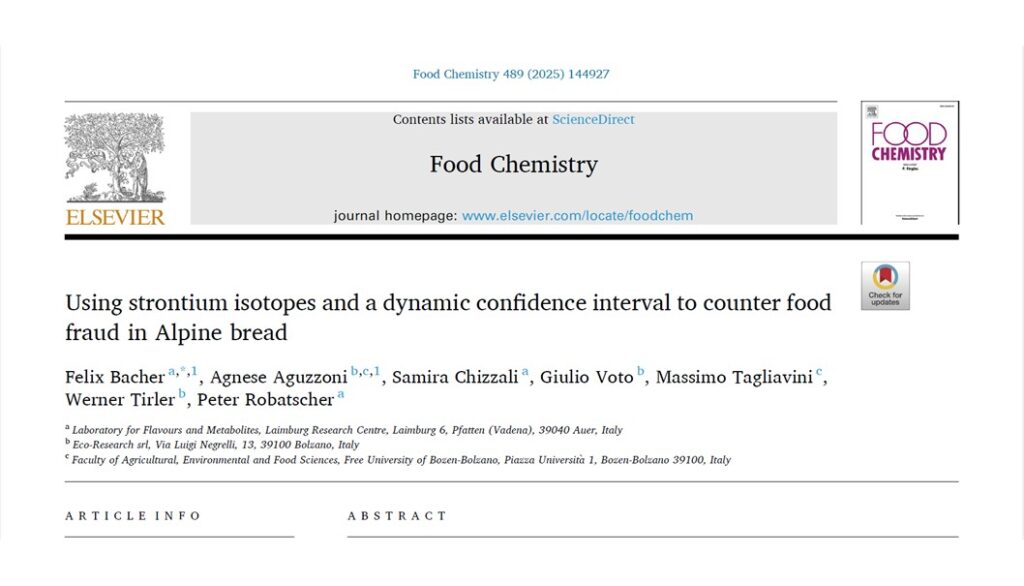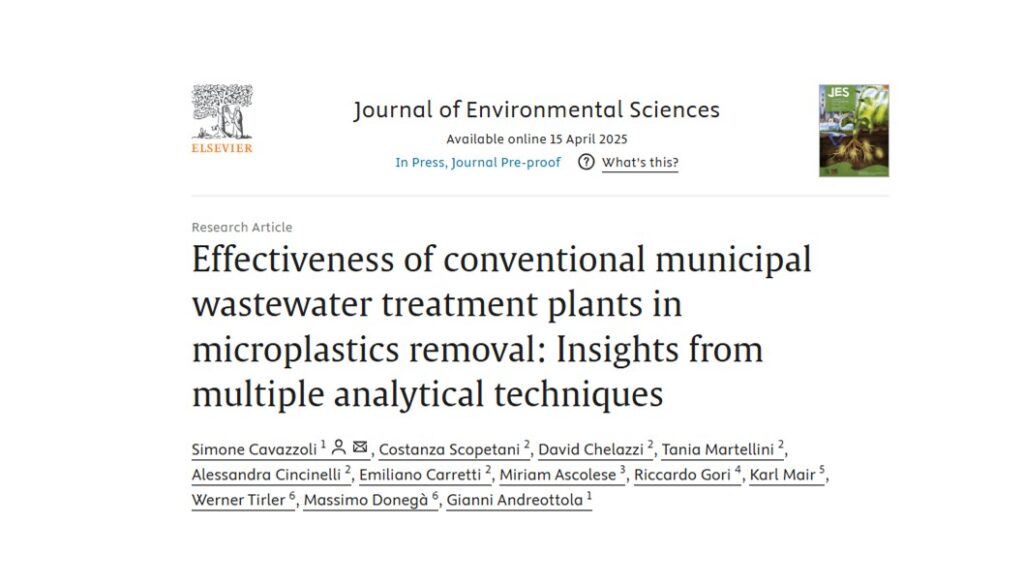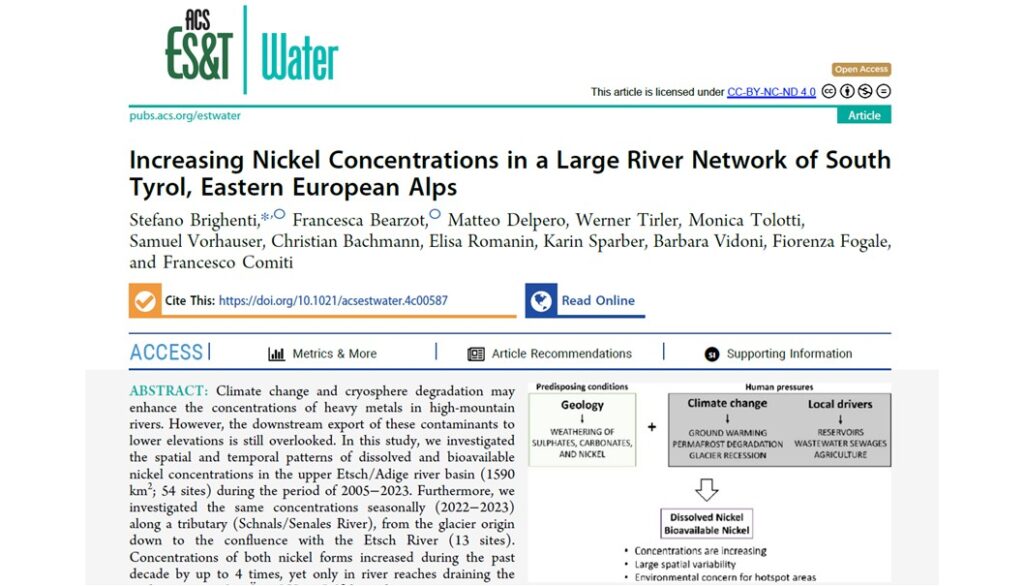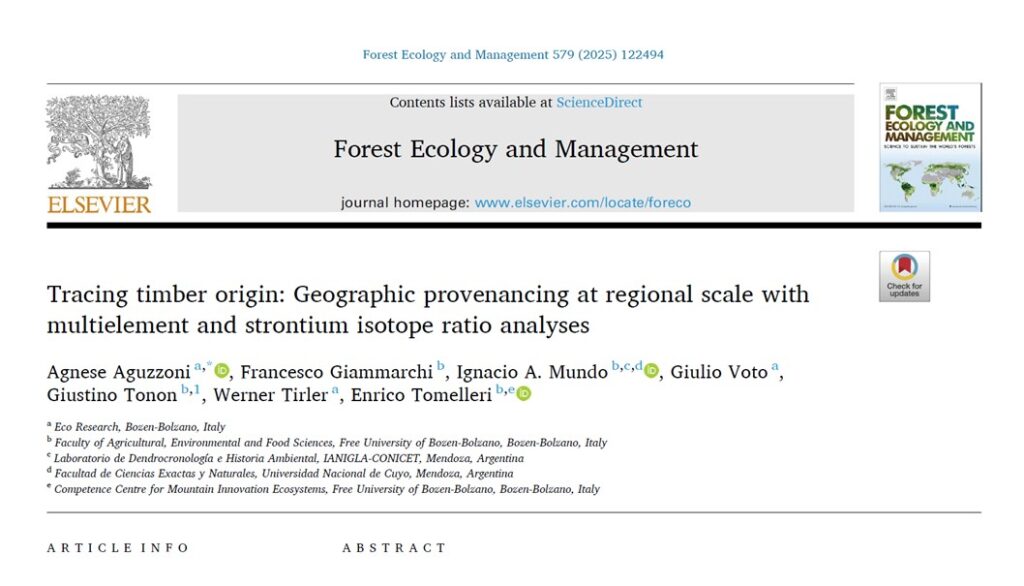Piano Clima Alto Adige 2040: project DICAM

Durata progetto: 2024-2026
Finanziamento: Programma FESR 2021/2027 – Secondo Bando – priorità 1 Smart – obiettivo specifico 1.1 – Ricerca e innovazione
Budget complessivo: 921.941,72 € …
Is it really Regiokorn bread? Strontium isotopes can tell us

The growing interest in local and high-quality products makes it increasingly necessary to have scientific tools capable of verifying their authenticity and protecting both consumers and producers from fraud. As demonstrated by previous studies, the strontium isotopic ratio is a very promising marker of origin, as it reflects the geo-lithological signature of the region where agri-food products originate. While tracing the origin of raw or semi-processed materials can be relatively straightforward, verifying the authenticity of processed products, such as bread, is far more complex.
Microplastic Removal from Urban Wastewater: A Study on the Efficiency of Treatment Plants

Global plastic production has increased significantly in recent decades, leading to growing concerns about plastic waste. One particularly urgent environmental issue is the spread of micro- and nano—plastic particles smaller than 5 mm that originate from the breakdown of plastic products or waste. In addition to posing risks to the environment and human health due to their persistence, these particles can also carry pathogens or release other pollutants. In urban settings, their presence in wastewater is primarily linked to domestic discharges and surface runoff. Since this water is treated in wastewater treatment plants (WWTPs), it is crucial to assess whether current treatment stages are sufficient to remove microplastics.
SiD – Science in Depth: un nuovo orizzonte per l’educazione scientifica

SiD – Science in Depth: un nuovo orizzonte per l’educazione scientifica Nasce il progetto SiD – Science in Depth, un progetto selezionato e sostenuto dal Fondo per la Repubblica Digitale Impresa sociale. Arciragazzi Bolzano APS è capofila di “SiD – Science in Depth”, una nuova avventura nel campo dell’educazione scientifica. Insieme ad una fitta rete […]
Nickel in Alpine Rivers Increasing Due to Cryosphere Degradation

Climate change not only reduces water reserves stored in glaciers and permafrost but may also contribute to the release of increasing amounts of solutes into high mountain rivers. Among these solutes, particular attention must be paid to heavy metals, such as nickel, which are abundant in certain rock types and are potentially toxic to aquatic organisms and human health.
The Chemical Fingerprint of Wood: Every Tree Reveals Its Origin

Where does the wood we use really come from? In a global context where the sustainable use of natural resources is increasingly urgent, answering this question is essential. Timber is a widely used raw material, and its illegal trade causes serious damage to ecosystems and biodiversity. Yet reliable tools to verify its geographical origin remain limited. A new study, conducted by Eco Research in collaboration with the Free University of Bozen-Bolzano, explores a concrete and effective solution: an approach that combines multi-element and isotopic analyses with advanced statistical models. The investigation focused on three typical tree species from the Eastern Alps – Norway spruce, European larch, and Swiss stone pine – grown on diverse bedrock types.
The results are promising: each species shows a distinctive chemical fingerprint, and the strontium isotopic ratio reliably reflects the geology of the growing area. This enables high-precision identification of both species and origin of each sample. The study opens new perspectives for the application of these techniques by regulatory authorities to verify timber origin, or by producers themselves to support certified supply chains.
Educational Collaborations for “Tomorrow’s Technicians”

The 2023/24 school year also concluded with a fruitful collaboration between Eco Research and the schools of Bolzano, aimed at training the “technicians of tomorrow”.
In particular, within the collaboration agreement with the “Galileo Galilei” Institute of Secondary Education, two internships of 76 hours each were conducted, one in September and one in October, with fifth-year students of the chemistry and environmental biotechnology course on the theme “Indoor Air Quality Analysis and Evaluation”…
The environmental challenge of the future: “Microplastic pollution”

The term “plastic” today encompasses thousands of products of various types. These cover a wide range of uses in everyday life and across the global population. Modern plastics exhibit vastly different characteristics from one another and are composed not only of the main polymer but also thousands of different molecules added to achieve the required properties for their use (plasticizers, colorants, softeners, flame retardants, etc.). The main characteristic of plastic is its durability over time, making it practically “eternal”: a plastic material product retains its characteristics and properties for decades, even when exposed to atmospheric agents. However, these agents have a significant abrasive effect and over time lead to the fragmentation of the polymer, resulting in “microplastics” (MPs). Microplastics have been found in every terrestrial environment, from the poles to glaciers, from surface soils to the deepest seas. To the extent that scientists worldwide now consider them one of the most significant environmental issues to address and resolve in the coming years…
Hydrological processes: insights from a three-year study in Alpine basins based on a multichemical approach

In mountainous regions, snow, glaciers, and rock glaciers play a significant role as valuable hydrological assets by supplying substantial quantities of meltwater for both surface and subsurface flows. The current climate changes are resulting in a global phenomenon of fast glacier retreat and an earlier onset of the snowmelt runoff season. Consequently, this trend is leading to a reduction in mountain water resources, which has repercussions on aquatic ecosystems and human societies…
Research program 2023-2025

The program agreement between the Autonomous Province of Bozen/Bolzano and Eco Research for the 2023/25 period was approved on 13 June 2023 by the Provincial Government. At the same time, the related funding agreement was signed, pursuant to the Provincial Research and Innovation Law (LP 14/2006).
“Eco Research’s 2023/25 research program is based on the principles of sustainability and the circular economy and is in line with the RIS3 strategy, the regional innovation strategy adopted by the Province”, explained President Arno Kompatscher in his dual role which also sees him as provincial councilor for Research and Innovation…
